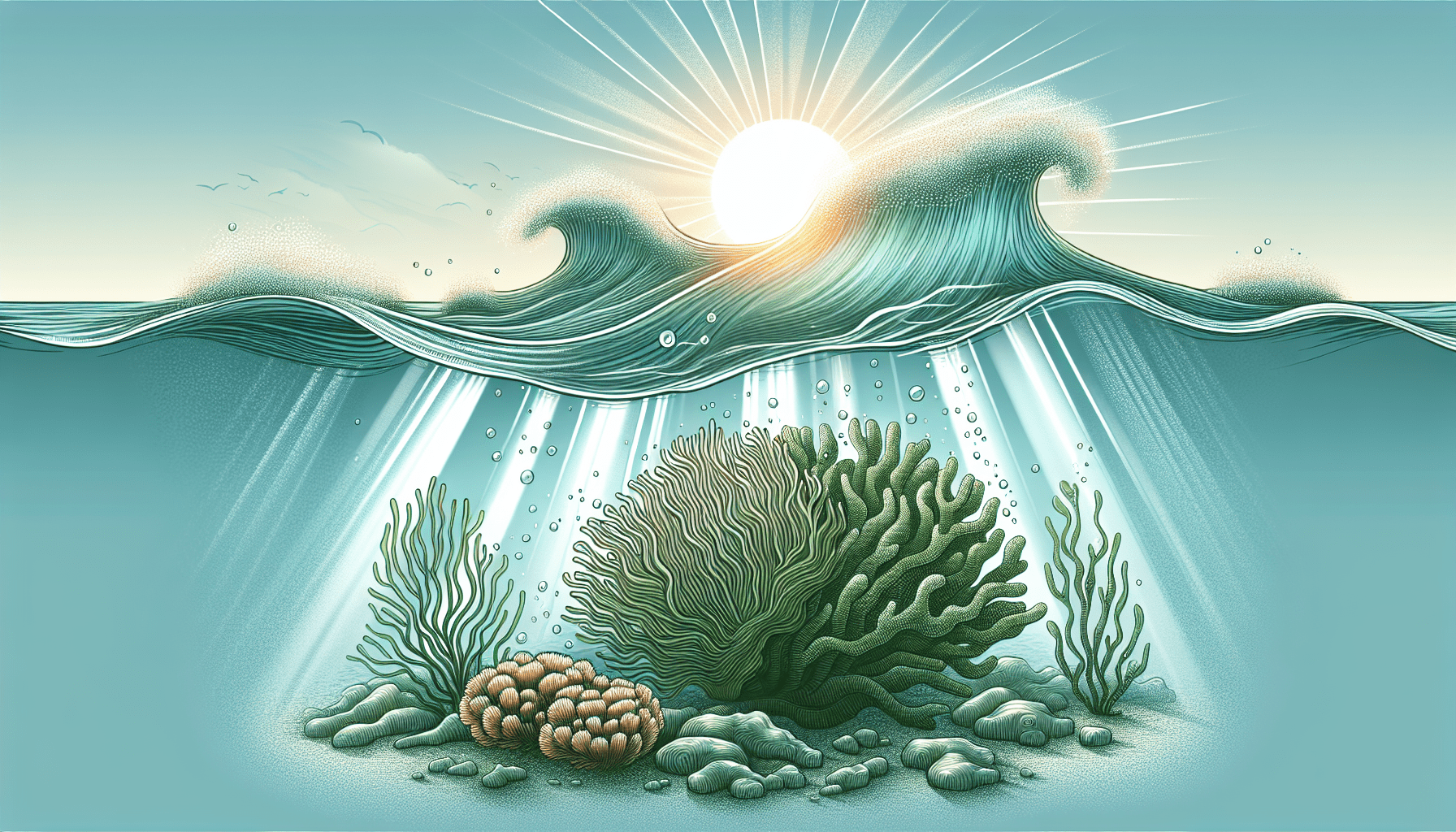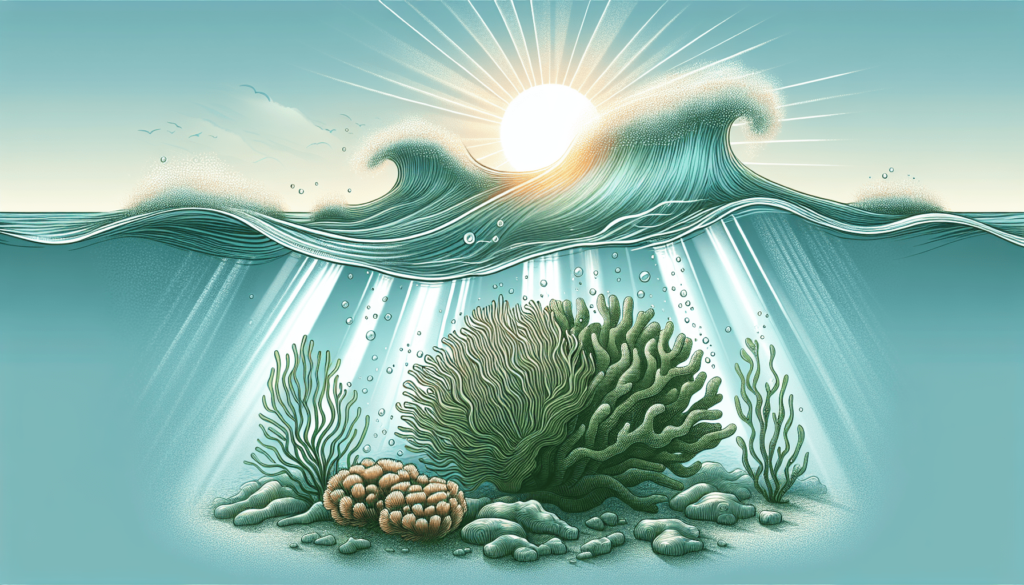The Best Fluffy Pancakes recipe you will fall in love with. Full of tips and tricks to help you make the best pancakes.

Have you ever wondered if sea moss could be a remedy for anxiety and depression? In recent years, this natural ingredient has gained popularity for its numerous health benefits. But does it hold the power to alleviate the symptoms of anxiety and depression? In this article, we will explore the potential effects of sea moss on mental well-being and delve into the scientific research behind its claims. So, if you’re looking for a natural solution to help manage your anxiety and depression, keep reading to discover all you need to know about sea moss.

What is Sea Moss?
Sea moss, also known as Irish moss or Chondrus crispus, is a type of seaweed that has been used for centuries for its various health benefits. It is a red algae that grows along the rocky parts of the Atlantic coastlines of Europe and North America. Sea moss is rich in essential vitamins, minerals, and nutrients, making it a popular ingredient in various traditional dishes and natural remedies. It is known for its gelatinous texture and has gained recognition in recent years for its potential medicinal properties.
Anxiety and Depression
Understanding Anxiety
Anxiety is a common mental health condition characterized by excessive worry, fear, or unease. It can manifest in various forms, such as generalized anxiety disorder (GAD), panic disorder, or social anxiety disorder. Anxiety can significantly impact a person’s daily life, affecting their relationships, work productivity, and overall well-being.
Understanding Depression
Depression is a mood disorder that causes persistent feelings of sadness, loss of interest, and a lack of motivation. It can interfere with a person’s ability to function and lead a fulfilling life. Depression is a complex condition that can be triggered by various factors, including genetics, hormonal imbalances, and life events.
Traditional Treatments
Traditional treatments for anxiety and depression often involve therapy, medication, or a combination of both. Therapy aims to help individuals identify and manage their triggers while providing emotional support. Medications, such as selective serotonin reuptake inhibitors (SSRIs), are commonly prescribed to help balance neurotransmitters and alleviate symptoms. While these treatments can be effective, some individuals may seek natural alternatives like sea moss to complement their existing therapies.
Potential Benefits of Sea Moss
Rich in Nutrients
Sea moss is packed with essential vitamins and minerals, including iodine, iron, magnesium, calcium, and vitamins A, E, and K. These nutrients are important for maintaining overall health and well-being. Adequate intake of these vitamins and minerals is known to support healthy brain function, boost energy levels, and improve immune system function.
Immune System Support
Sea moss has long been recognized for its immune-boosting properties. Studies have shown that it contains certain compounds known to support and strengthen the immune system. A robust immune system is vital for protecting the body against infections, viruses, and other harmful pathogens. By incorporating sea moss into your diet, you may be able to enhance your body’s natural defense system and reduce the risk of falling ill.
Anti-Inflammatory Properties
Chronic inflammation has been linked to various health conditions, including anxiety and depression. Sea moss contains properties that may help reduce inflammation in the body. By reducing inflammation, sea moss has the potential to alleviate symptoms associated with anxiety and depression, as studies have suggested a correlation between inflammation and mental health disorders.
Potential Antidepressant Effects
Some studies indicate that certain compounds found in sea moss may have antidepressant effects. These compounds are believed to influence neurotransmitters in the brain, such as serotonin and dopamine, which play a crucial role in regulating mood and emotions. By affecting these neurotransmitters, sea moss may help alleviate depressive symptoms and promote a more positive mood.
Scientific Research
Studies on Sea Moss and Anxiety
While there is limited scientific research specifically focusing on the effects of sea moss on anxiety, some studies have explored the potential benefits of seaweed in general. These studies have shown promising results, suggesting that seaweed consumption may have anxiolytic (anti-anxiety) effects. Although more research is needed, these initial findings are encouraging and warrant further investigation into the specific effects of sea moss on anxiety.
Studies on Sea Moss and Depression
Similar to anxiety, there is a lack of studies specifically examining the effects of sea moss on depression. However, studies on other types of seaweed have provided insights into the potential benefits. Some compounds found in seaweed have been shown to possess antidepressant properties, and it is possible that sea moss, with its similar nutrient profile, may exhibit similar effects. More research is needed to establish a definitive link between sea moss and its impact on depression symptoms.
Understanding the Mechanism
Role of Nutrients
Sea moss contains a wide range of nutrients that are essential for maintaining optimal brain health. These nutrients, such as magnesium, calcium, and B-vitamins, support critical brain functions and help regulate mood. Adequate intake of these nutrients can promote the production of neurotransmitters involved in anxiety and depression regulation, potentially alleviating symptoms.
Impact on Neurotransmitters
Neurotransmitters, such as serotonin, dopamine, and GABA, play a significant role in regulating mood and emotions. Compounds found in sea moss may act on these neurotransmitters, enhancing their production or availability in the brain. By modulating neurotransmitter levels, sea moss may help promote a more balanced emotional state and reduce symptoms of anxiety and depression.
Influence on Brain Function
Sea moss contains essential fatty acids, like omega-3s, which are known to support brain health and function. These fatty acids contribute to the structural integrity of brain cells and play a role in neurotransmitter signaling. By providing the necessary building blocks for optimal brain function, sea moss may help improve cognitive abilities, reduce brain fog, and enhance overall mental well-being.
Personal Experiences
Anecdotal Evidence
Many individuals have reported positive experiences with sea moss supplementation, claiming that it has helped relieve symptoms of anxiety and depression. While anecdotal evidence should be taken with caution and may not reflect everyone’s experience, these accounts provide valuable insights into the potential benefits of sea moss for mental health.
User Testimonials
Online forums and social media platforms are filled with user testimonials attesting to the positive effects of sea moss on anxiety and depression. Individuals have shared their personal experiences, discussing how incorporating sea moss into their diets or daily routines has positively impacted their mental well-being. These accounts serve as firsthand accounts of the potential benefits of sea moss but must be considered alongside scientific research.
Expert Opinions
Views from Health Professionals
Health professionals, including naturopathic doctors and integrative medicine practitioners, have expressed interest in the potential benefits of sea moss for anxiety and depression. While acknowledging the need for further research, many experts suggest that sea moss can be a valuable addition to existing treatment plans. They emphasize the importance of an individualized approach and recommend seeking professional guidance for the appropriate use of sea moss in managing anxiety and depression.
Researcher Perspectives
Researchers involved in the studies exploring the effects of seaweed on mental health have highlighted the need for more comprehensive research specifically examining the effects of sea moss. They emphasize the importance of rigorous scientific investigation to determine the potential mechanisms and efficacy of sea moss for anxiety and depression. Further studies will provide a deeper understanding of the topic and contribute to the growing body of scientific knowledge.
Considerations and Precautions
Potential Side Effects
While sea moss is generally considered safe for consumption, some individuals may experience side effects. These can include gastrointestinal disturbances, such as bloating or diarrhea. It is crucial to start with small amounts and monitor your body’s response to sea moss. If adverse reactions occur, it is recommended to discontinue use and consult a healthcare professional.
Allergies and Sensitivities
Individuals with a known allergy to seaweed should exercise caution when considering sea moss supplementation. Allergic reactions can vary from mild to severe, and it is essential to seek medical advice before consuming sea moss or any seaweed-derived products. Additionally, individuals with thyroid disorders should consult with a healthcare professional due to the iodine content in sea moss.
Interactions with Medications
As with any natural supplement, sea moss may interact with certain medications. It is crucial to consult with a healthcare provider before starting sea moss supplementation, especially if you are taking medications for anxiety or depression. They can provide guidance on potential interactions and ensure the safety and efficacy of integrating sea moss into your treatment plan.
Dosage and Recommendations
Safe Usage Guidelines
There is no established dosage or recommended intake for sea moss in the treatment of anxiety and depression. It is advised to start with small amounts, such as one teaspoon per day, and gradually increase if well-tolerated. It is crucial to listen to your body and adjust the dosage accordingly. Additionally, be sure to choose high-quality, sustainably sourced sea moss from reputable suppliers.
Consulting a Healthcare Provider
If you are considering sea moss as a complementary approach for anxiety and depression, it is essential to consult with a healthcare provider. They can assess your individual needs, evaluate potential interactions with existing medications, and provide personalized advice based on your specific health circumstances. A healthcare professional can guide you in incorporating sea moss into your overall treatment plan in a safe and effective manner.
Conclusion
Overall, sea moss has gained attention for its potential benefits in managing anxiety and depression. While scientific research on the specific effects of sea moss on these mental health conditions is limited, it offers a rich nutritional profile that can support overall well-being. The nutrients found in sea moss, along with its potential anti-inflammatory and antidepressant effects, offer a promising foundation for further investigation.
With a growing body of anecdotal evidence, user testimonials, and interest from health professionals, sea moss shows potential as a natural supplement to complement existing anxiety and depression treatment strategies. However, it is important to approach sea moss as a complementary approach and not a substitute for professional medical advice or prescribed treatments.
As research into the effects of sea moss on anxiety and depression continues to unfold, it is crucial to stay informed, consult healthcare professionals, and make informed decisions regarding your mental health and well-being. Future studies will provide additional insights into the powerful potential of sea moss as a natural option for managing anxiety and depression.




